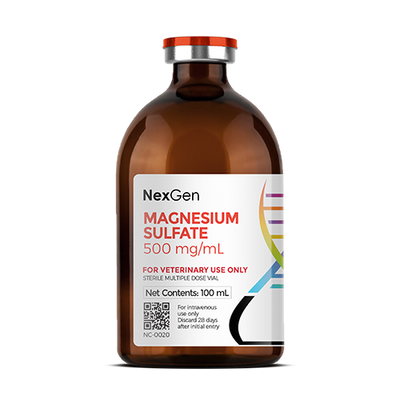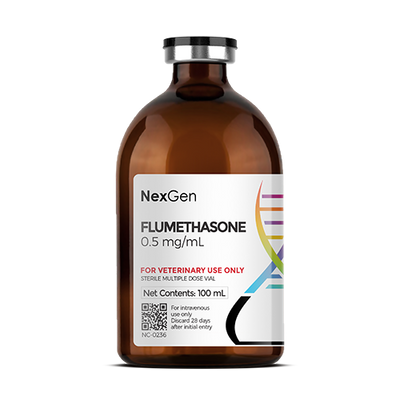
Ammonium Sulfate 7.5 mg/mL, Injectable Solution, 100mL
Login for pricing
- Brand
- Mixlab
- SKU:
- NC-0175
- Product Type:
- Injectable
- Size:
- 100ml
- Administration:
- Intramuscular
Ammonium sulfate is commonly prescribed for urine acidification in horses, as acidification of the urine can help prevent equine urolithiasis (upper urinary tract or bladder stones). Bladder stones are most commonly seen in adult horses, but can occur at any age. Male horses (and geldings in particular) make up 75% of all cases of bladder stones which are generally attributed to a longer urethra which prevents stone clearance.1
Bladder stones (uroliths) form when urinary crystals precipitate and build upon a cluster of epithelial cells which are shed from the bladder wall. Factors which are thought to contribute to stone formation include prolonged urine retention, increased excretion of calcium, uric acid or oxalates in urine.2 Horses excrete a large amount of calcium carbonate crystals in their urine and have an alkaline pH which favors crystallization.
There are two types of urinary stones found in horses. Type I stones are the most common (in 90% of cases), composed of calcium carbonate and are easily broken up. Type II stones are made up of calcium carbonate, phosphate, and magnesium. These are generally harder to break up and have a different appearance than Type I.1
Symptoms and Treatment of Urolithiasis (Bladder Stones) in Horses
Signs of urolithiasis include blood in the urine after exercise, blood or urine staining on the hindlimbs, dribbling of urine, difficulty urinating, prolonged periods where a male horse’s penis is dropped down, and/or a stiff hindlimb gait.2Incontinence may result in urine scalding of the perineum in females or of the hindlimbs in males.1
A diagnosis of urolithiasis can be made by a veterinarian via palpation of the bladder rectally, ultrasound of the bladder, and/or endoscopic exam of the urethra and bladder.2 In most cases, surgery is required in cases of urolithiasis; with the horse under standing sedation, the bladder can be accessed via laparocystotomy, perineal urethrotomy, or pararectal cystotomy.1 The bladder can then be flushed thoroughly with saline to remove all stone fragments.2 To prevent future stone formation, calcium levels should meet but not exceed the horse’s daily requirements.
Ammonium Sulfate for Horses
Acidification of the urine with ammonium sulfate can also help prevent stones, however this is often a challenge because ammonium products found in feed (ammonium chloride, ammonium sulfate, ascorbic acid) are often unpalatable to horses. Thus, injectable forms are preferred.
Where to buy Ammonium Sulfate
Ammonium Sulfate is available in the U.S. through several pharmaceutical manufacturers and through veterinary custom compounding companies. AMMONIUM SULFATE 7.5 MG/ML by NexGen Pharmaceuticals is indicated for the prevention of urolithiasis in the horse.
Please consult your veterinarian prior to beginning any treatment regimen.
FOR RX ONLY: A valid prescription from a licensed veterinarian is required for dispensing this medication.
2Mair, T.S., Holt, P.E. The aetiology and treatment of equine urolithiasis. Equine Veterinary Education, 1994, 6 (4), 189-192.




















